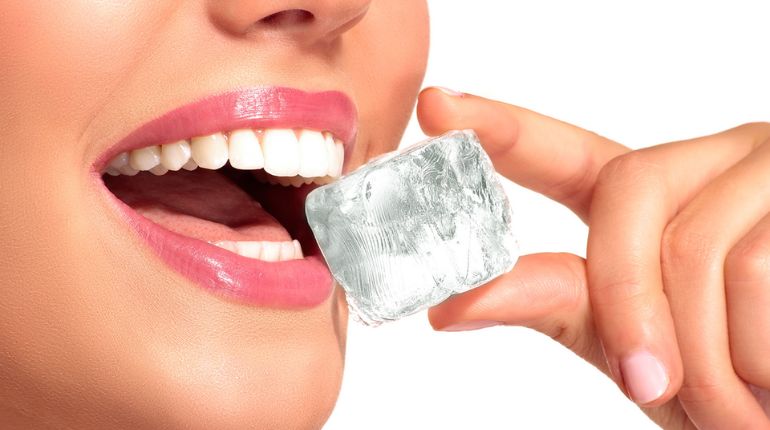


Can Chewing Ice Cubes Damage Your Teeth?

Chewing on ice cubes might seem like a harmless habit—after all, it’s just frozen water, right? Many people enjoy the cool crunch of ice, especially on a hot day, without realizing the potential harm it can cause to their teeth. However, this seemingly innocent activity can lead to serious dental issues over time.
The Impact of Chewing Ice
Your teeth are incredibly strong, but they’re not invincible. Chewing ice cubes can cause various problems, from minor discomfort to significant dental damage. Here’s how:
- Enamel Erosion: The outer layer of your teeth, known as enamel, is the hardest substance in the human body. However, it can still be worn down by the repeated force of crunching on hard objects like ice. Once your enamel is eroded, it cannot regenerate, leaving your teeth more vulnerable to decay and sensitivity.
- Cracks and Chips: Ice is hard and can cause your teeth to crack or chip, especially if they already have weakened areas due to previous dental work or decay. These cracks can lead to pain, increased sensitivity, and the need for costly dental repairs.
- Damaged Dental Work: If you have fillings, crowns, or veneers, chewing ice can cause them to loosen, crack, or break. This can lead to further complications, including the need for replacement work.
- Gum Damage: Sharp edges of broken ice can also injure your gums, causing irritation or cuts. Damaged gums are more prone to infection, leading to gum disease.
Why Do People Chew Ice?
Understanding why people chew ice is important in addressing the habit. For some, it’s simply a way to cool down or enjoy a refreshing crunch. However, in many cases, chewing ice can be a sign of a condition known as pica, which is characterized by cravings for non-nutritive substances. Pica can sometimes be linked to nutritional deficiencies, such as iron-deficiency anemia.
If you often crave to eat ice or other unusual substances, it's important to talk to your doctor, or if you are looking for an expert dentist in Bistupur who can help you or your loved one overcome this habit, then feel free to schedule a consultation at Omkarnanda Dental Care and Research.
Tips to Break the Habit
If chewing ice has become a habit, it’s important to take steps to protect your teeth. Here are some strategies to help you stop:
- Switch to Softer Alternatives: If you enjoy the sensation of chewing, try softer alternatives like sugar-free gum or crunchy vegetables like carrots and celery. These options are much safer for your teeth and can satisfy the urge to chew.
- Stay Hydrated: Sometimes, the craving for ice can stem from dehydration. Ensure you drink plenty of water throughout the day to stay hydrated. This can reduce your desire to chew on ice.
- Seek Professional Help: If your ice-chewing habit is linked to pica or a nutritional deficiency, addressing the root cause is essential. A healthcare provider or dentist in Bistupur can guide you on the right treatment plan to manage your cravings and protect your oral health.
Conclusion
In summary, while chewing ice cubes may seem harmless, it can lead to significant dental problems, including enamel erosion, cracked teeth, and damaged dental work. Understanding the risks and protecting your teeth is important for good oral health.
Breaking the habit of chewing ice might take effort, but your teeth will thank you in the long run.
If you’ve noticed any issues with your teeth or want to discuss your ice-chewing habit, feel free to visit our expert dentist in Bistupur at Omkarnanda Dental Care and Research or contact us at +91 8986637327 to discuss your eating habits.